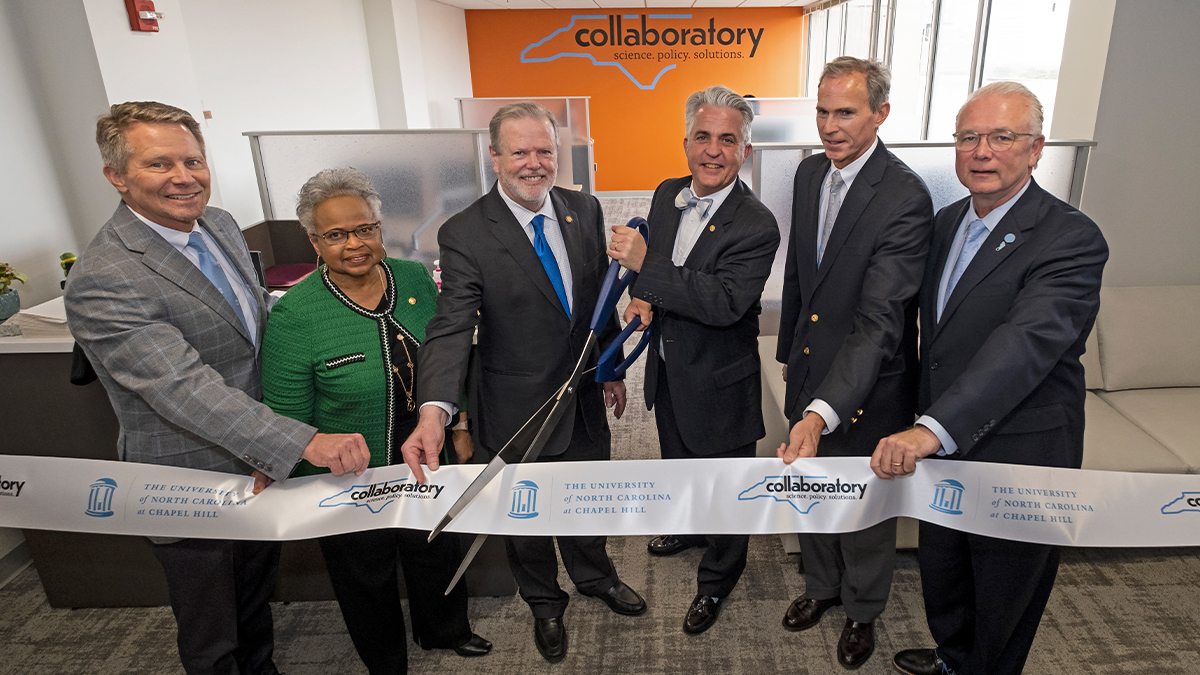North Carolina Collaboratory opens offices
On March 22, campus leaders gathered to cut the ribbon on the Collaboratory’s new dedicated space on campus in the Kenan Labs.

University and state leaders officially opened the North Carolina Collaboratory’s offices in Kenan Labs on March 22 with a ribbon-cutting ceremony.
“The Collaboratory has given many of our researchers the resources they need to solve the great challenges of our time,” said Chancellor Kevin M. Guskiewicz. “This will be a place where researchers, students, faculty and the people of our state come together to work and collaborate.”
In 2016, the N.C. General Assembly established the North Carolina Collaboratory to facilitate the dissemination of policy and research expertise of the UNC System and other universities across the state to solve North Carolina’s most pressing challenges through collaboration. In 2018, the Collaboratory received its first large appropriation of $5 million to study per- and polyfluoroalkyl substances, or PFAS, in North Carolina. Since then, the Collaboratory’s funding has grown to $148 million and includes research partnerships with experts from every part of the state. After seven years of Collaboratory staff working from various locations of Carolina’s campus, the ribbon cutting marked the opening of the official, dedicated offices for the Collaboratory.
“What began as an initial annual recurring legislative appropriation of $1 million quickly expanded to a total of $148 million – almost half of which is devoted to COVID-related projects,” said the Collaboratory’s Executive Director Jeffrey Warren. “To address this rapid and unprecedented growth, operational support from Carolina enabled a critical scale-up of our abilities to plan, manage, measure and assess our research portfolio and its outcomes.”
At the ribbon cutting, Warren highlighted several current research projects funded by the Collaboratory that immediately impact the state and its citizens, including:
- After the initial study on PFAS, the Collaboratory assembled a team to test water supplies in more than 400 locations across the state and then created a resin-based filtration technology to filter out the harmful contaminants.
- During the COVID-19 outbreak, Associate Professor Ronit Freeman’s lab developed rapid COVID-19 test strips using sugar-based polymer technology.
- North Carolina has the largest lithium deposits in North America and the mineral is necessary for manufacturing batteries. The Collaboratory is funding research on lithium extraction with minimal environmental impact.
“These research initiatives go beyond gathering information and often invent and deploy technological solutions that tangibly improve people’s lives. Technology is what makes science real for people outside of academic circles,” Warren said.
In his remarks, Board of Trustees Chair David Boliek discussed the immediate impact the Collaboratory is having on the state.
“The mission of the Collaboratory is to support research that informs policymakers and solves real-world problems that affect North Carolinians. Research and solutions for North Carolina in this endeavor will absolutely be lasting,” Boliek said.
N.C. Senate President Pro Tempore Phil Berger and state Sen. Gladys Robinson also attended the ribbon cutting.
“I know as far as the General Assembly is concerned, we consider the Collaboratory a great success,” said Berger.
Learn more about the North Carolina Collaboratory at TheWell.UNC.edu




